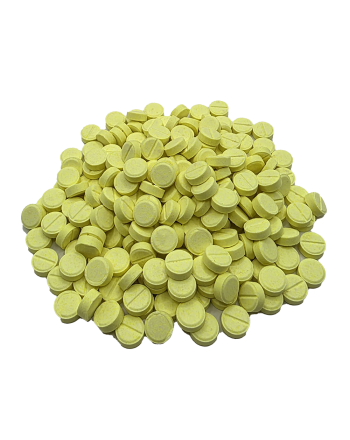Want to buy Diphenyl?
Diphenyl is a collective term for various types of substances with primarily analgesic effects. These are comparable to opioids, which can suppress severe pain but also stimulate feelings of relaxation and euphoria. Human use of diphenyl is strongly discouraged; research chemicals are not sold for these purposes, only for research. Funcaps offers high-quality diphenyl and ensures fast and discreet delivery.
What is Diphenyl?
Diphenyl, also known as Biphenyl, is an organic compound consisting of two interconnected benzene rings. This substance occurs naturally in petroleum and coal tar, for example, but is also produced synthetically for research purposes. In laboratories, Diphenyl is mainly used for chemical analyses and experiments to learn more about the effects and possible risks of research chemicals.
What are the effects of Diphenyl?
Diphenyl is studied in laboratories because of its similar properties to opiates. Under laboratory conditions, the substance has been shown to mimic a strong analgesic effect. In addition, there are indications that Diphenyl can also have a calming and slightly euphoric effect in certain test models. This makes it interesting for experimental research into pain relief.
In addition to these possible “positive” effects, studies have also shown negative effects in test subjects, such as nausea, itching and dizziness. Always read up thoroughly before you start anything. Research chemicals are expressly not intended for human consumption.
Risks of Diphenyl
In addition to the positive effects, Diphenyl can also entail risks. These include:
- Suppression of breathing;
- Drowsiness;
- Dizziness or nausea;
- Reduced alertness during experiments;
- Addiction potential.
It is therefore important that Diphenyl is used exclusively for scientific research and that applicable safety protocols are always followed. Use outside of a controlled setting is strongly discouraged.
In what form is diphenyl available?
At Funcaps, you can buy diphenyl in two forms: pellets and powder. For Funcaps, the most common test substance within the diphenyl category is IC-26 (HCI). The choice of a particular form depends on the type of research you are conducting. Pellets are useful for accurate dosing and reproducibility in experiments, while powder is often used in analytical or chemical research where flexibility in dosing is important. Both forms are supplied with the highest degree of purity and are intended for professional use in a laboratory setting.
Safety recommendations for all Research Chemicals
When using Diphenyl in a laboratory setting, it is important to proceed with caution. Below are the most important precautions that apply to all research chemicals.
Safety recommendations (P phrases)
1. P102: Keep out of reach of children.
2. P202: Do not perform any work before reading and understanding all safety recommendations.
3. P210: Keep away from heat, hot surfaces, sparks, open flames and other ignition sources. No smoking.
4. P221: Take measures to prevent static electricity discharges.
5. P233: Store in a tightly closed container.
6. P240: Use grounded and well-conducted equipment.
7. P241: Use explosion-proof electrical/ventilation/lighting equipment.
8. P242: Use non-sparking tools.
9. P260: Do not breathe dust/fume/gas/mist/vapour/spray.
10. P261: Avoid breathing dust/fume/gas/mist/vapours/spray.
11. P262: Avoid contact with eyes, skin or clothing.
12. P263: Avoid contact during pregnancy or breastfeeding.
13. P264: Wash thoroughly after handling.
14. P271: Use only outdoors or in a well-ventilated area.
15. P273: Avoid release to the environment.
16. P280: Wear protective gloves/protective clothing/eye protection/face protection.
17. P305+P351+P338: IF IN EYES: Rinse cautiously with water for several minutes; remove contact lenses, if possible; continue rinsing.
18. P333+P313: If skin irritation or rash occurs: Get medical advice/attention.
19. P391: Clean up spilled/leaked substance.
Application and Context
Research chemicals are chemical substances used primarily for scientific research. They are not intended for human consumption. It is crucial to follow the appropriate safety recommendations to minimise exposure and harmful effects. When working with these chemicals, appropriate protective measures must always be taken, such as wearing personal protective equipment (gloves, safety goggles, lab coats) and working in a well-ventilated area or under a fume hood. It is also essential to seek immediate medical attention in case of exposure or incidents. If you feel unwell after (accidental) ingestion and/or contact, we advise you to consult a poison control centre or a doctor immediately.


